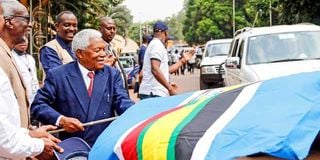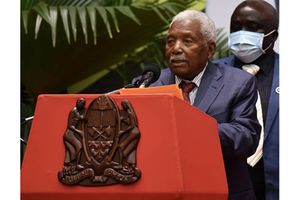
Ali Hassan Mwinyi as head of the EAC Election Observer Mission in Uganda on February 12, 2016. The former Tanzanian president died of lung cancer on Thursday evening.
Ali Hassan Mwinyi had an unassuming personality. When he began his 10-year tenure as Tanzanian president in 1985, he endured the omnipresent shadow of his predecessor Julius Nyerere. That was an inspiration and a challenge.
Mwinyi would later write in his memoir that he was not sure how Nyerere, who remained an influential figure in Tanzanian politics until his death in 1999, viewed his presidency.
“Looking back, I am drawn to think that he mistook my humility for weakness in leadership,” he writes.
While never a global statesman like Nyerere or his successor Benjamin Mkapa, president Mwinyi demonstrated his enthusiasm for integration on the regional front by reopening Tanzania’s borders, which had technically been shut following the 1977 break-up of the East African Community (EAC).
The break-up was due to the war between Tanzania and Idi Amin’s Uganda on one side, and an ideological row between Nyerere and his Kenyan colleague Jomo Kenyatta on the other.
After emerging from Nyerere’s shadow, regional integration became Mwinyi’s enduring legacy.
In May last year, he urged EAC member states to declare November 30 a general public holiday as a way of enhancing citizens’ awareness of and participation in the integration.
The EAC Tripartite Commission was launched in Kampala, Uganda, on November 30, 1993, marking the rebirth of the bloc.
It is recognised as EAC Day but not a public holiday in any of the members.
Mwinyi, Daniel arap Moi of Kenya and Yoweri Museveni of Uganda presided over the Tripartite Commission’s establishment when EAC began a rebuild as he neared the end of his tenure.
Of the three, only Museveni is still alive and in power. The EAC now has a membership of eight, the others being Rwanda, Burundi, South Sudan, the DR Congo and Somalia.
In the recent event organised by Vision East Africa Forum in Dar es Salaam, Mwinyi said November 30 should be set aside for East African citizens to engage in collective social activities that promote unity.
During his presidency, Mwinyi wanted free cross-border trade and movement of people.
He later inspired the launch of The EastAfrican newspaper in 1994 to much fanfare in Tanzania, Kenya and Uganda.
Yet with such actions, Mwinyi was in a way curtailing the socialist vision of Nyerere.
Mwinyi took over a country that was on the brink of economic ruin, thanks in large part to Nyerere’s pet Ujamaa na Kujitegemea (Socialism and self-reliance) a form of Marxist-Maoist collective governance.
At first, few people saw Mwinyi as having the assertiveness that would enable him carve a niche as a reformist, spearheading Tanzania’s rocky but successful switch from state-controlled enterprises to free market.
He also dumped single-party politics for pluralism.
One of Mwinyi’s most significant moves was to do away with restrictions on imports and open the doors for private enterprise, thereby earning the abiding nickname Mzee Rukhsa, loosely translating to “permissive elder”.
Born in Kivure village, Pwani Region, on May 8, 1925,Mwinyi had a mixed political background.
He studied in Zanzibar and Mainland Tanzania, explaining the confusion that sometimes surrounds his origin.
In the country’s political tradition, Mainland Tanzania and Zanzibar often shared out power, for inclusivity. But it wasn’t until Samia Suluhu Hassan became President that Zanzibar produced its first Tanzanian head of state.
Mwinyi led at a crucial period in Africa as countries were cajoled into democracy. Yet his service and departure also signalled Tanzania’s enduring tradition admired by peers.
After him, four presidents followed including incumbent Suluhu. Jakaya Kikwete took over from Mkapa.
The transitions also indicated the strength of the ruling Chama Cha Mapinduzi (CCM). One of the oldest ruling outfits on the continent still in power (it was formed in 1977 though its precursor parties; Afro-Shirazi and Tanzania African National Union), CCM has maintained the grip on power.
Leaders in and outside Tanzania condoled with Tanzania and Mwinyi’s family on Thursday.
Suluhu announced the death in a televised address, saying Mwinyi had been treated in Tanzania and the UK. She declared seven days of mourning.
President William Ruto of Kenya said Mwinyi was a great leader whose legacy would not fade.
His predecessor, Uhuru Kenyatta, said Mwinyi would be remembers for his significant contributions to politics, economic development and regional diplomacy.
In his 2021 autobiography Mzee Rukhsa: Safari ya Maisha Yangu, Mwinyi takes pride in his administration’s achievements in instituting economic reforms, saying though it was “a task that wasn’t easy, change was a must”.
“It was shortly after I came to power that we finalised negotiations with the World Bank and the International Monetary Fund and began implementing their so-called economic reform programmes,” he says in the book.
Nyerere’s refusal to compromise with the Bretton Woods institutions was one of the main reasons he took the decision to step down after 24 years as Tanzania’s leader.
Prefacing the 491-page memoir, Mkapa supports Mwinyi’s argument that he took over from Nyerere when reforms were necessary to win over the international lenders and donor countries that had suspended budgetary support to Tanzania.
In the autobiography, Mwinyi describes the failure of the “Ujamaa” project in translating into “the best economic outcomes that we had anticipated”.
He also talks of the challenges the country’s economy faced – “which were mostly a result of our model, thus demonstrating the need for reforms”.
In retirement, Mwinyi was known for sticking to a rigorous fitness regimen that included daily jogging and regular participation in charity walks and runs.
It was this health-conscious routine that kept him sprightly and socially active until November last year when he was diagnosed with lung cancer.
“Mzee Rukhsa” died at Emilio Mzena Memorial Hospital in Dar es Salaam, less than three months from his 99th birthday.
He was to be buried in the archipelago on Saturday.







